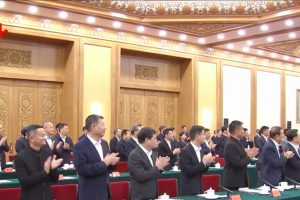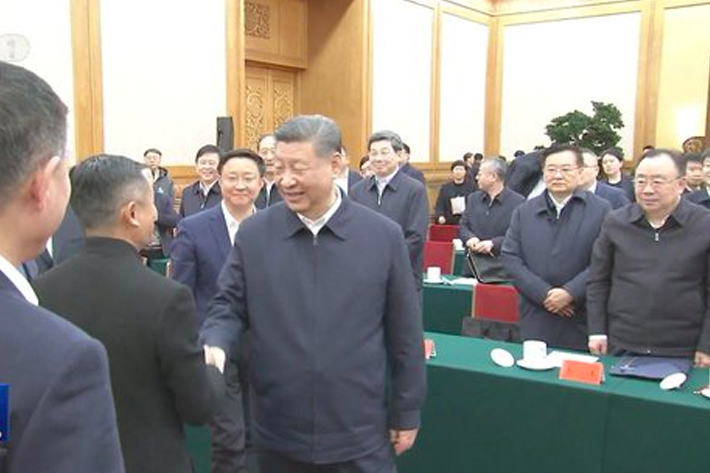Chinese president Xi Jinping’s high-profile meeting with the country’s tech leaders combined with the breakthrough development of DeepSeek is changing sentiment on the country’s beaten-down stocks, investment banks say.
Bankers say Chinese tech shares now have the potential to tempt back long-term investors — a shift that would imply a significant change in mindset and money flows.
“(Last year) many investors we spoke to still regarded China as a ‘trading market’ – fast money comes and goes to play the trading bounces, whereas global long-term capital remains unconvinced and little involved,” China equity analysts from Bank of America Securities said in a February 17 note.
Also on AF: China’s Xi Meets Top Tech Chiefs, Baidu Shares Slip as CEO Absent
That view, however, could be shifting to “investable”, BofA analysts said.
“Encouragingly, we think the fundamental investment thesis for China has been improving,” they added, citing longer-term tailwinds such as rising dividends and investment flows from insurers.
In a similar vein, Goldman Sachs upgraded its targets on Chinese stock indexes on Monday, estimating that AI adoption could boost earnings growth and potentially bring in $200 billion of inflows.
Those views reflect in the moves of Hong Kong’s Hang Seng index which has come within a whisker of three-year highs this week. Investors are cheering Xi’s Monday meeting with tech leaders, including the once-pariah Alibaba founder Jack Ma.
The high-profile symposium is being seen as a sign of a thaw in Beijing’s approach to the tech industry. The Communist state has previously subjected the tech industry to widespread crackdowns that have eroded at least $1 trillion worth of market cap of its biggest names.
A tale of two meets
Monday’s meeting underlined Beijing’s changing priorities, especially when seen in comparison to a similar gathering Xi hosted in 2018.
That year, the executives granted coveted front-row seats came from industries ranging from high-tech to energy, and few were familiar names.
But fast-forward seven years, that line-up changed markedly, with Huawei’s founder Ren Zhengfei and BYD’s Wang Chuanfu sitting opposite Xi.

Alibaba’s Jack Ma and Tencent’s Pony Ma, among the biggest targets of Beijing’s previous private sector crackdown, were also seated in the front row. Wang Xing, founder of China’s largest delivery platform, Meituan, sat in the second row.
Also at the frontlines were founders of smartphone and EV-maker Xiaomi and AI start-up DeepSeek.
The firms, most of which are giants in their sectors and controversial abroad, are key to achieving Xi’s belief that “new productive forces” are needed for China to escape its middle-income trap, compete with the United States and revitalise a stubbornly sluggish domestic economy, analysts said.
“The line-up of entrepreneurs suggests that Xi’s priority for the private sector is for it to support his goals of achieving technological self-reliance and supply-chain security,” said Neil Thomas, a fellow on Chinese politics at the Asia Society Policy Institute’s Center for China Analysis.
By contrast, the symposium held in 2018 drafted companies from across industries that included many smaller firms, such as software engineering firm Neusoft and car parts manufacturer Wanxiang. Tencent and Baidu attended, according to local media, but were not given front-row seats.

‘Hard pill’
“The mentality of the Chinese leadership has changed,” said Alfredo Montufar-Helu, head of The Conference Board’s China Center, a think tank.
“It’s a hard pill for them to swallow, but compared to 2018 they are now recognising that these Chinese tech companies’ contribution to economic growth is greater than they previously believed,” Montufar-Helu said.
Most notable was the presence of Alibaba’s Ma, who shook hands with Xi. That exchange was seen by many as the rehabilitation of a tech leader who largely withdrew from public life after authorities halted the IPO of his fintech company Ant Group in 2020.
“Jack Ma’s appearance is highly symbolic, as his company bore the brunt of the previous regulatory campaign,” Macquarie economists Larry Hu and Yuxiao Zhang said in a note.
Alibaba’s stock has risen 53% this year, gaining 3% on Tuesday after Ma was shown on TV shaking hands with Xi and up 8% since Reuters first reported the plans for the meeting.
China’s ‘terrific ten’
In addition to the Xi’s meeting with China’s tech VIPs, the mood-shift also owes much to the combination of buzz around DeepSeek, which roiled Wall Street last month when it said it had developed an open-source AI model that was far cheaper and energy-efficient than its Western rivals.
For investors it was also a sign that China had not been deeply impacted by big US sanctions.
Under the spotlight are the so-called “Terrific Ten” Chinese tech stocks as an alternative to the US Magnificent Seven.
“China’s Terrific Ten can only be described as crushing the Magnificent 7,” said Jeff Weniger, head of equity strategy at WisdomTree Asset Management, on X.
“This kicked off a half year ago, but so few have noticed.”
The Ten are e-commerce heavyweights Alibaba and JD.com, automakers Geelyand BYD, tech conglomerate Xiaomi, online giants Tencent and Netease, search-engine operator Baidu, food delivery firm Meituan and chipmaker SMIC.
Hang Seng’s hot streak
The terrific ten have played a significant role in helping Hang Seng gain over 17% this year, vying with Germany’s DAX for the title of best performing major market. Buying has been concentrated in tech shares, with the Hang Seng Tech index surging 33% in just a month.
To be sure, brokers warn much of the rally has been driven by hedge fund and retail investor money, which is prone to leaving quickly. But the fact that positioning is so light has many anticipating that there is fuel for further gains.
“While it is hard to predict the duration of this AI-driven rally in China internet stocks, we firmly believe that this trend will last more than a month,” JP Morgan analysts led by Alex Yao wrote in a February 17 note.
“The AI boom in the US stock market has been steadily advancing for two years, during which the average stock price of the ‘Mag 7’ has risen by 256%.”
The Magnificent Seven consist of Alphabet, Amazon, Apple, Meta, Microsoft, Nvidia and Tesla.

- Reuters, with additional editing and inputs from Vishakha Saxena
Also read:
Investors Pour Money Into China Tech Stocks Amid DeepSeek Fever
More Concern on DeepSeek’s Data Policies After ByteDance Link
China Tightens Focus on Tech Innovation, ‘New Productive Forces’
China Needs Tech Self-Reliance to Avoid Being Strangled: Xi
Baidu to Offer Ernie Chatbot For Free Amid DeepSeek Challenge
Apple Taps Alibaba to Bring AI to Chinese iPhones
BYD to Offer Tesla-Like Self-Driving Tech in All Models For Free
BYD in Talks to Supply Carbon Credits to European Carmakers
US-China Trade War Goes Into Gear as Beijing’s Tariffs Kick In
Trump Inauguration: Cautious China Wants ‘A New Start’ With US
China Aims for Self Sufficiency in Emerging Tech, AI, Big Data
Meta Set up ‘War Rooms’ to Study DeepSeek AI Model – Fortune
























